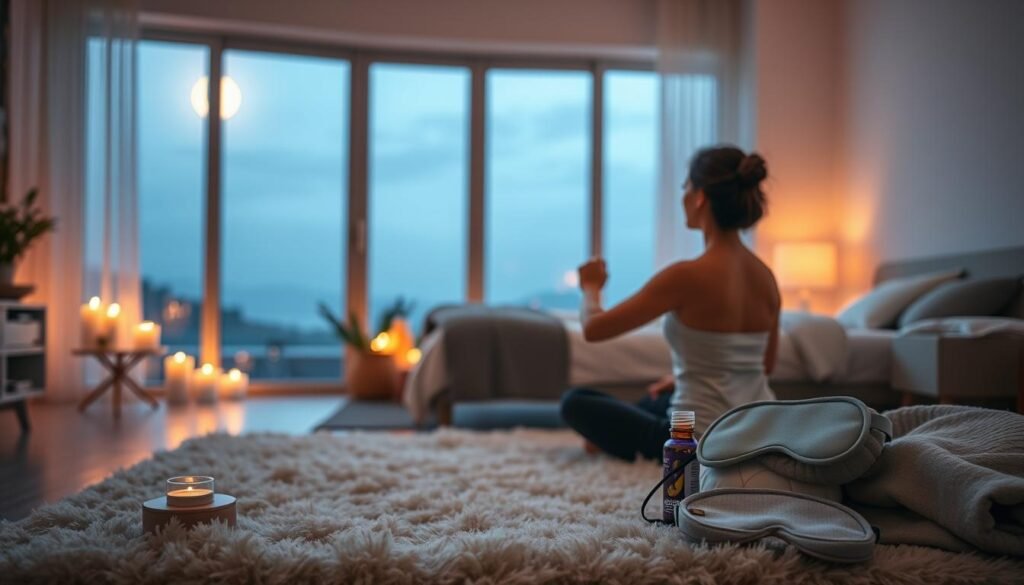Do you wonder why some fall asleep easily while others toss and turn? Knowing what affects your sleep is key for those who can’t sleep well. This article shares tips for better sleep, showing how small changes in daily habits can lead to peaceful nights. You don’t have to struggle to find restful sleep; learning about your sleep patterns can truly make a difference.
Key Takeaways
- Understanding the reasons behind sleepless nights is the first step to finding relief.
- Creating a sleep-friendly environment plays a significant role in improving sleep quality.
- Establishing a consistent bedtime routine can enhance your overall sleep experience.
- The right nutrition and mindful eating habits can influence how well you sleep.
- Natural remedies can complement traditional approaches for insomnia relief.
- Addressing stress and anxiety is essential in the quest for better sleep.
Understanding Sleepless Nights
Sleepless nights can be tough, impacting your daily routine and health. It’s important to understand why insomnia happens. Stress, lifestyle, and where you live can all play a part.
Common Causes of Insomnia
There are several reasons why people have trouble sleeping:
- Stress and anxiety: Daily pressures may keep your mind busy, making it difficult to wind down.
- Medication side effects: Some medicines might mess with your sleep.
- Environmental factors: Loud sounds or an uncomfortable bed can make it hard to sleep.
The Impact on Your Health
Losing sleep can harm your health. Research shows it might lead to:
- Physical health issues: There’s a higher chance of getting heart disease and becoming overweight.
- Mental health concerns: It can make you feel more anxious, sad, and affect your thinking.
- Weakened immune response: You might get sick more easily.
This shows why sleep is so important for your well-being.
When to Seek Professional Help
If you can’t get rid of insomnia, it might be time to get help. Especially if:
- It’s been several weeks and nothing has worked.
- You’re always tired and it’s messing with your daily life.
- You’re dealing with heavy anxiety or depression.
Create a Sleep-Friendly Environment
Making your bedroom a peaceful place can really help you sleep better at night. Having the perfect setting involves a lot of things. This includes finding the best bed and keeping the room at the right temperature. Trying out these tips for better sleep can make a big difference in how well you rest.
Importance of a Comfortable Mattress
Finding the perfect mattress is key to sleeping well. It should fit what you like, whether that’s firm or soft. Brands like Tempur-Pedic and Purple make mattresses for all kinds of sleepers. This makes it easier to enjoy a good night’s sleep.
Optimal Room Temperature
The best temperature for sleeping is between 60-67°F. Keeping your room in this range makes it easier to sleep. To stay cool, try using sheets that breathe and comfy bedding. This helps you sleep better.
Reducing Noise and Light
To sleep well, your room should be quiet and dark. Blackout curtains block light, and white noise machines drown out noise. With these steps, you can make your bedroom a place for great sleep.
Establishing a Bedtime Routine
A consistent bedtime routine is key for healthy sleep. It syncs your body’s clock, helping you sleep and wake up better. Calming activities before bed can also improve sleep quality. Here are some tips to craft an effective bedtime routine.
Benefits of a Consistent Sleep Schedule
Sticking to a regular sleep schedule helps your body’s natural clock. Sleeping and waking at the same times every day makes falling asleep easier. This regularity boosts energy levels and well-being over time.
Relaxation Techniques Before Bed
Relaxing before bed brings many benefits. Activities like reading, deep breathing, or gentle stretching help reduce stress. They prepare you for sleep, fitting perfectly with good sleep habits.
Limiting Screen Time in the Evening
Cutting down on screen time is vital for better sleep. Screens’ blue light can make falling asleep difficult. Using night mode on devices or switching screens off an hour before bed helps a lot. These tips can lead to a restful night.
Nutrition and Sleep Quality
Eating right is key for good sleep. The right foods help you sleep well. Bad foods can mess up your sleep. Know which foods to avoid for better sleep plans.
Foods to Avoid Before Bed
Some foods can ruin your sleep. Heavy meals make you uncomfortable. Spicy foods can give you heartburn. Sugary snacks keep you awake. Choose your nighttime snacks wisely to sleep better.
The Role of Caffeine and Alcohol
Caffeine and alcohol affect your sleep. They are found in coffee, tea, sodas, and drinks. Caffeine can disturb your sleep cycle. Alcohol might make you sleepy but ruins deep sleep. Knowing this can guide your drink choices for better sleep. Research backs this up.
Sleep-Inducing Snacks
Some snacks can help you sleep. Bananas, almonds, and oatmeal are good for bedtime. They help your body relax. Adding them to your evening routine can improve sleep.
Natural Remedies for Better Sleep
Exploring natural remedies can make a big difference in sleep quality. Many turn to herbal teas, supplements, and relaxation techniques. These holistic methods help address sleep problems and promise more restful nights.
Herbal Teas and Supplements
Herbal teas, like chamomile and valerian root, are top choices for better sleep. Chamomile tea eases anxiety and brings peace before bed. Valerian root has sedative qualities. Melatonin supplements are useful too, as they adjust the sleep-wake cycle.
Aromatherapy to Promote Relaxation
Aromatherapy with essential oils sets the stage for sleep. Lavender oil, with its soothing scent, improves sleep. Using essential oils in the bedroom or in a bath helps relax the body and mind.
Mindfulness and Meditation Practices
Mindfulness and meditation are key for better sleep. Deep breathing, muscle relaxation, and guided imagery reduce stress. They also get the mind ready for sleep. Regular mindfulness practice leads to more sleep and better quality rest.
The Role of Physical Activity
Being active is key to sleeping well. Studies show that working out helps you fall asleep faster and sleep better. Adding exercise to your routine is a great tip for better sleep.
How Exercise Affects Sleep
Working out helps lower stress and anxiety, making it easier to sleep. It boosts endorphins, improving your mood and helping you relax. By exercising regularly, you get more deep sleep each night.
Best Times to Work Out
When you exercise is important for good sleep. Working out in the morning or early afternoon is best. This helps your body calm down by bedtime. Avoid intense workouts right before bed to prevent restlessness.
Gentle Exercises for Relaxation
Yoga or tai chi can make sleep better. These exercises reduce stress and ready the body for rest. They also improve flexibility and mindfulness, perfect for better sleep.

Technology and Sleep
These days, technology deeply affects how we sleep. It’s key to understand its impact on sleep quality. Knowing about blue light, sleep apps, and ways to lessen tech disruptions is vital.
Blue Light and Its Effects
Blue light from phones, tablets, and PCs can mess with sleep hormones. This light, especially at night, can make it hard to fall asleep. Using blue light filters or wearing special glasses can help.
Sleep Tracking Apps: Do They Help?
Sleep apps are becoming more popular to check on sleep health. They show your sleep patterns and any interruptions. But, they might make some people anxious. Whether they’re helpful varies by person.
Avoiding Sleep Disruptions from Devices
Setting tech limits can improve sleep. A no-tech period before bed is a good idea. Turning off gadgets an hour before sleeping helps your brain wind down.
Keeping devices out of the bedroom also reduces the urge to use them at night.
| Aspect | Impact on Sleep | Recommended Actions |
|---|---|---|
| Blue Light | Delays melatonin production | Use filters or glasses |
| Sleep Apps | Provides insights or causes anxiety | Use them wisely |
| Device Disruption | Interrupts relaxation | Establish technology-free time |
Addressing Underlying Stress and Anxiety
Stress and anxiety often lead to sleep issues, so dealing with them is key. Managing stress well can improve your sleep chances. Techniques exist to lessen these feelings, which boosts mental health and sleep quality.
Techniques for Managing Stress
Here are some ways to handle stress daily:
- Cognitive Behavioral Therapy (CBT): This approach changes negative thoughts that cause stress.
- Journaling: Writing your thoughts can make things clearer and lessen anxiety, aiding sleep.
- Time Management Strategies: Organizing tasks helps prevent feeling overwhelmed and lowers stress.
Importance of Mental Health in Sleep
Mental health is crucial for good sleep. Bad mental health can make insomnia worse, causing more distress. By improving mental well-being, your sleep and overall health get better.
Seeking Support from Friends and Family
Talking to loved ones helps manage stress. It provides emotional support and decreases loneliness. Sharing your struggles and getting advice can offer new ways to cope with insomnia and stress.

The Importance of Professional Guidance
When you can’t sleep well on your own, it’s key to get professional help. If you have ongoing insomnia that messes with your day, feel hopeless about sleeping, or tried many sleep tips without success, seek help. These signs signal it’s time to act for better sleep.
Therapies for insomnia really help solve sleep problems. A top method is Cognitive Behavioral Therapy for Insomnia (CBT-I). It deals with the main reasons you can’t sleep. Research shows it really works to make sleep better.
Many people now enjoy more restful nights thanks to structured therapy. You can choose from individual or group therapy for tailor-made sleep strategies. If simple tips don’t work for you, professional help could change your sleep for the better. To find out more about working treatments, visit insomnia relief solutions.